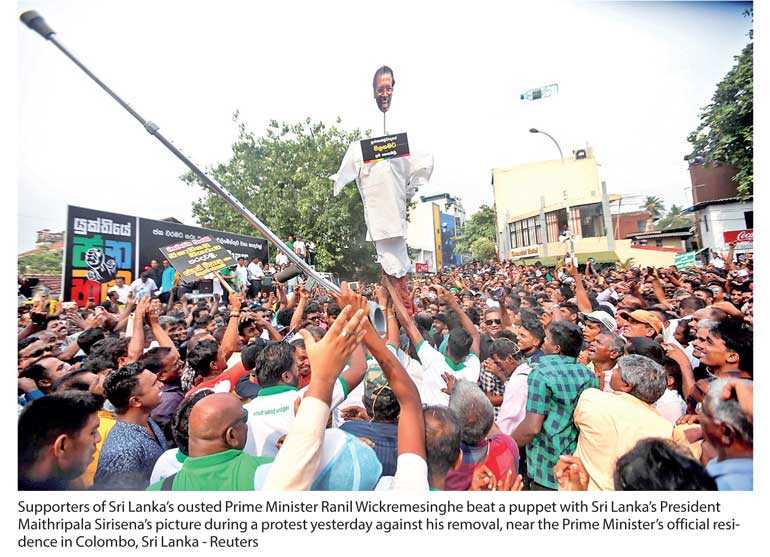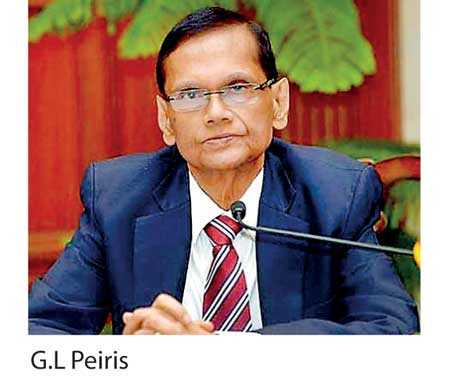Thursday Feb 26, 2026
Thursday Feb 26, 2026
Wednesday, 31 October 2018 00:00 - - {{hitsCtrl.values.hits}}


Adding to the ongoing debate on the constitutionality of the decision by President Maithripala Sirisena to remove Ranil Wickremesinghe from the post of Prime Minister, Sri Lanka Podujana Peramuna (SLPP) Chairman Prof. G.L. Peiris said yesterday that the Constitution recognises removal or dismissal by the President as a mode of ending the tenure of the Prime Minister.
“When the governing provisions of the Constitution are accurately stated in their complete form and taken into account, there can be no conceivable doubt that the President’s power to dismiss the Prime Minister is expressly contemplated by the Constitution,” G.L Peiris said in a statement issued yesterday.
Hence, he said that the dismissal of Wickremesinghe and appointment of Mahinda Rajapaksa as Prime Minister on 26 October 2018 was entirely in keeping with the Constitution and there had been no infringement of its provisions in any respect.
The following is the full text of Peiris’ statement.
There is extensive discussion in the media regarding the legality of the action taken by President Maithripala Sirisena during the evening of Friday, 26 October to remove Mr. Ranil Wickremesinghe from the position of Prime Minister and to appoint instead Mr. Mahinda Rajapaksa.
Continuing discussion of the legal issues is taking place on the basis of a fundamental misconception. It has been assumed that there is no provision in the Constitution of Sri Lanka empowering the President to remove the Prime Minister. This is entirely incorrect.
Section 48(i), which is part of the 19th Amendment, explicitly refers to removal or dismissal as one of the methods by which the Prime Minister ceases to hold office. The words used in the Sinhala text are the following: “OQrfhka bj;alrkq ,eîfuka fyda b,a,d wiaùfuka fyda wkHldrhlska fyda w.%dud;Hjrhd OQrh oeÍu k;r jQ õg”
The Constitution therefore in express terms recognises removal or dismissal by the President as a mode of ending the tenure of the office of the Prime Minister.
This vital provision has escaped notice in the current discussion because it is not reflected in the English version.
There is a crucial difference between the Sinhala and English versions. The English version uses the words: “On the Prime Minister ceasing to hold office by death, resignation or otherwise.” The reference to removal or dismissal is deleted.
I was a Member of Parliament when the 19th Amendment was discussed and enacted by Parliament. This happened during the so-called 100-day period between the Presidential Election of 8 January 2015 and the Parliamentary Election of 17 August 2015.
I was personally aware that it was the Sinhala version which was put to the House, clause by clause, during the Committee Stage by Mr. Chamal Rajapaksa, Speaker of Parliament at that time. It was the Sinhala version which was considered and adopted by Parliament. The English version did not receive the attention of Parliament at all.
In any event, in the event of any discrepancy, it is the Sinhala version that prevails. Indisputably, the Sinhala version is the authoritative version of the law.
This vital fact is lost sight of in all the discussion which is now taking place.
When the governing provisions of the Constitution are accurately stated in their complete form and taken into account, there can be no conceivable doubt that the President’s power to dismiss the Prime Minister is expressly contemplated by the Constitution.
The dismissal of Mr. Ranil Wickremesinghe and appointment of Mr. Mahinda Rajapaksa as Prime Minister on 26 October 2018 is therefore entirely in keeping with the Constitution and there has been no infringement of its provisions in any respect.